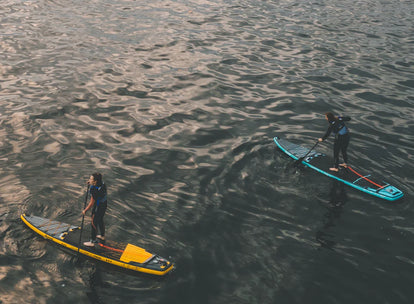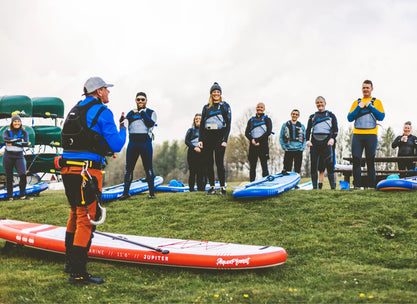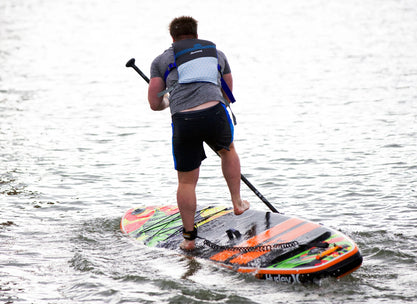So you’ve got your general paddle boarding technique down, you’re comfortable on the water and at ease exploring your surroundings. So what now? Well you don’t need to jump straight into planning a paddle boarding voyage across the channel, in fact the next thing on your paddle boarding to-do list can be to learn some fun beginner tricks. These top beginner paddle board tricks are sure to impress your friends (if you get them right) or get you a lot of laughs (if you get them wrong). So technically it’s a win-win.
Many of these paddle boarding tricks will actually help you develop and improve your current paddle boarding skills which could help your overall technique and performance.
Pivot Turn On A Paddle Board

The first paddle boarding trick we are going to run through is the ‘pivot turn’ or ‘step back turn’. Not only does a pivot turn look cool, it's also really handy if you need to change direction quickly and is the fastest method to turn your board around. You can go for the 180 turn to begin with and build up to 360 and even beyond if you like a challenge.
- To begin your pivot turn, when the board is gliding over the water you will need to turn yourself sideways into a surfing stance.
- Place your feet shoulder width apart and face towards the side edge of your paddle board with knees slightly crouched. Make sure your feet are positioned down the centre line of the board and your foot at the back is the one with the ankle leash on.
- Once you feel steady enough, you need to edge slightly towards the back of the board keeping in this position.
- When the nose of the board is slightly raised out of the water you should use your usual paddle turning technique with large strokes.
- Once you are facing in your desired direction you can step back to the centre and face forward again.
Paddling Backwards

Paddling backwards might sound a bit unconventional but aside from being a fun technique to learn it can also be useful if you have become stuck somewhere or are positioning yourself for a paddle boarding race. Paddling backwards is exactly as it sounds - you paddle backwards!
- Ensure you have properly checked your surroundings before you start this trick, the last thing you want is to crash into something or someone.
- Make sure you are in the centre of your paddle board with a typical paddle boarding stance facing forwards.
- Swivel your paddle so that the front of it is now facing the same direction as the back of your board.
- It might feel awkward at first but you’re now going to have to try and replicate your usual paddle motion but with your arms facing the wrong way.
- As you paddle be sure to check behind you following the arm that is leading the water strokes, this will help to prevent any back or neck injuries. E.g. if the paddle is in the water on your right, turn and follow through with your neck to look behind you.
- Only do 1-2 strokes on each side before switching, if you attempt any more than this the board will start to rotate due to the fin on the bottom leading the way.
Paddle Board Headstand

Definitely the most difficult of our paddle boarding tricks on this list, the mighty headstand. Now technically speaking, this could be classed as more of a SUP yoga pose rather than a ‘trick’, but as there are a number of progression steps towards a full on headstand it can be a good trick for beginners to learn too.
- Choose some calm and flat water where the water is unlikely to be disturbed by boats or other activities.
- Put your paddle in the holder so it is out of the way
- Get onto all fours with your hands shoulder width apart either side of the handle
- Place the top of your head as centre to the board as you can, next to the handle and move your hand positioning so you have an even triangle.
- Ensure your elbows are bent at 90 degrees over your hands.
- Lift your knees off of the board and stretch them out with the tips of your toes keeping you steady on the board.
- Start to slowly walk your feet in towards your head to get your hips aligned with your shoulders.
- Once you feel stable you can lift your knees to rest on your elbows
- After you feel confident in this position you can engage your core muscles and slowly lift your knees up, until they are straight in line with your hips and shoulders
- Keep your shoulders up and away from the board to prevent the weight being held on your neck and head
- Slowly reverse the steps to return to the starting position.
With a paddle board headstand it is a good idea to build up to it, that way you’ll get the right technique in the long run. For your first couple attempts go for step 1 to step 4, then build up to step 6 and so on. Trying to go the whole hog on your first time is unlikely to go well and you’ll probably get frustrated and give up especially if you’ve never even attempted a headstand on dry land before...
Remember…
When first trying any new paddle boarding tricks you should assume that you are likely to fail the first few times and end up in the water, so make sure you’ve picked your location carefully and have lots of space away from any potential hazards and obstacles, it also goes without saying you need a buoyancy aid.
With all these tricks, start small and build up to the final result. You’re unlikely to get it the first time so breaking it down step by step gradually will help you to get the hang of it. Above all else, it is supposed to be fun! If you feel yourself getting frustrated or fed up, take a break and come back to the trick another time, you’d be surprised how much being calm will help you to progress your tricks!
Don’t forget to tag us in your SUP tricks on instagram @aquaplanetsup_aus, we love to see them! The good, the bad and the ugly (we won’t laugh too much, promise)


